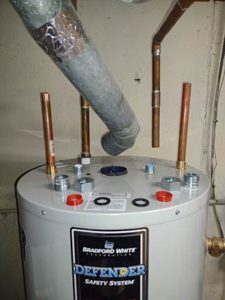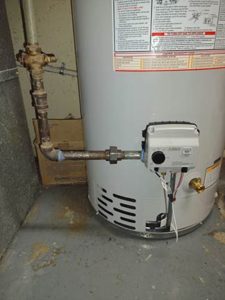 The average homeowner has all kinds of pressing issues they need to spend money on. Anything that is not deemed to be absolutely necessary will tend to get swept to the background. But sometimes, it can be hard to determine what is necessary and what is not.
The average homeowner has all kinds of pressing issues they need to spend money on. Anything that is not deemed to be absolutely necessary will tend to get swept to the background. But sometimes, it can be hard to determine what is necessary and what is not.
For instance, although you know the importance of a working water heater in your home, deciding the right time to replace it can be difficult. When a water heater malfunctions, your first instinct is to fix it. But fixing a water heater is not always the cost-effective option, sometimes it is cheaper to replace it.
But you will only realize this if you are not keeping track of your water heater repair costs. Without this, it is easy to keep spending money on the system without ever realizing you have spent enough to buy a brand new water heater, warns Alltrade Properties.
What are the simple ways to know if your water heater has reached the end of the road and it is time to get a new one?
A water heater is a very simple device. Its major parts are a tank, gas burner or electric element, and thermostat. Common problems you will have with the water heater include thermostat malfunctions, circuit breaker trips, T&P relief valve issues, stuck valve, low or high water pressure, damaged gaskets, and leaks from plumbing connections.
For most of these problems, a plumber will not charge you more than $150 – $300 to fix them. Such minor issues do not justify replacing the water heater. That is as long as the issues do not become frequent. Even small issues can become major problems if they happen often.
On the other hand, if the water heater is leaking as a result of the tank being corroded, fixing it might not be a good idea. This is not because the tank cannot be repaired, but because compared to the price of a new water heater, the cost of fixing the tank doesn’t just make any sense.
WHEN TO REPLACE YOUR WATER HEATER
As a standard rule, if the cost of fixing the water heater equals 50% of its replacement cost, you should replace the water heater. What this means is if it would cost you about $1500 to get a new water heater, you should not spend more than $750 to fix the water heater.
But even this is a lot of money to spend on repairs. If a water heater costs $750 to repair every year and you could easily buy a new one for $1500, would you not be better off buying the new water heater and avoiding all the hassles of fixing the old one again and again?
This is why the Association of Certified Home Inspectors suggests that you replace your water heater if the cost of repairs exceeds 10% of the cost of the appliance. Here is a summary of factors to look at to determine if you should repair or replace your water heater.
THE FREQUENCY OF DAMAGE
A simple cost-benefit analysis before doing repairs will tell you if it is better to replace or repair. This exercise should not consider the cost of repairs alone; it should factor in the frequency of repairs. Even if the cost of repair is little, it could become a lot over time. Additionally, you want to find out if the technician offers warranties.
THE TYPE OF DAMAGE
The type of damage you are dealing with will also play a role in deciding the better course of action. As already mentioned, if water has reacted with the steel body of the water beater and corroded the tank, repairing it might not make sense. Generally, if you have a tank leak, you should replace the system.
THE SYSTEM’S ENERGY EFFICIENCY
Even if your water heater is not malfunctioning, you should still replace it if the cost of operating it is too high. If the water heater loses heat (has an R-value less than 24) or is pushing up your water bills, you should replace it. The savings in energy bills will help you recoup the cost of a new water heater.
THE AGE OF THE WATER HEATER
A water heater nearing or past the age of ten should be replaced. Ten years is the average lifespan of a water heater. The only time this does not apply is if you have a storage tank or heat pump (which lasts up to fifteen years), a solar water heater (which can last 20 years), or a tankless water heater (which can last more than 20 years).
THE HIDDEN COST OF A NEW WATER HEATER
In addition to the cost of buying a new water heater, there are other costs you have to think about. In some areas, building codes can impose requirements that push the cost of installing the system up. If the cost of installing the water heater is too high, you may delay replacing it until you can afford it.
Comments
Post a Comment